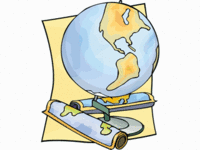
Reaching out to former enemies is exceedingly hard. Why do warriors find it so impossible? How do groups that have been at war find ways to be at peace?General Richard Meyers, head of the Joint Chiefs, recently retired, and warned of "the long war" on terrorism during his closing remarks.
Though the actual level of armed conflict is lower than it has been in past decades, it does not feel that way to many of us. Perhaps it is because our own nation has been so polarized in recent years.
Ironically and sadly, it is often religious as well as political and economic differences that separate people into conflicting factions. Islam as a religion is sometimes wrongly singled out. It is no more likely to be at fault than any other major religion. In any religious conflict it is only the extremist who sees THE OTHER as the enemy.
Reconciliation seems particularly hard in the Middle East. Iraq's ethnic factions have not found a way to do it, except by Kurds and Shiites freezing out the Sunnis. In fact the country seems to be on the verge of all out civil war. Iraqi families are paying a very heavy price for the failures of their leaders. In Gaza the failure of Hamas and Fatah to cooperate assures that Palestinians cannot yet govern their own territory. Neither of those armed factions has yet been skillful enough at reconciliation to share governance, following Israel's pullout from their territory.
But there are also signs that peace may be breaking out in the Middle East between some who have been enemies for a very long time. Pakistan and India are making progress in resolving their differences after many years. There have again been religious dimensions to the Pakistani-India conflict. Peace between the nations means resolving border conflict, dealing with the Kashmir issue, and resuming trade and economic development.
Turkey's entry into the European Union will not be easy, but the process has begun. Turkey is at the junction of the Middle East and Europe. Again, a big part of the E. U. reluctance to admit Turkey has to do with their mistrust of Islam.
Further into Europe, Kosovo is at the crossroads of becoming a nation because of years of intensive U.N. nation-building. Religious conflict, a history of ethnic cleansing, and economic difficulties caused huge pain and dislocation in the Balkans, and it has been an extremely difficult process.
The good news is that there people of good will talking about these larger questions. I have previously posted about a couple of earlier conferences: The Third Way, Conference that will make a difference, and Out of pocket.
There was a very good conference on September 21, sponsored by the New America Foundation and moderated by Steve Clemons, blogger of The Washington Note. The links are now up for playback of some excellent presentations. It was entitled, "Beyond Bullets: Economic strategies in the fight against terrorism." I particularly recommend the videos of presentations by Seymour Hersh and Harriet Babbitt.
In one of the ultimate reconciliations of enemies of all times, I close with this good news/bad news piece. The United States and Russia live out reconciliation every day on the International Space Station, though problems between governments remain. Ironically, NASA's administrator, Michael Griffin says that Moscow's demands for payment could end U. S. participation in the ISS program. If you can imagine this "6 degrees of separation" kind of connection, here's the deal. A 2000 law bans space-station related payments to Russia because Russia helped Iran build a nuclear plant. Here we are forgetting how Russia has often "saved our bacon" with our space program. With something as seemingly elemental as this, you would think our government leaders would be able to live out reconciliation principles more wisely.
2 comments:
I am reminded of Pitt's observation on England's attitude towards France during the French Revolution..."To suppose that any nation could be unalterably the enemy of another was weak and childish."
You are on target, Bobby. As Pitt implies, and we all instinctively know, people we elevate to positions of authority need to at least be able to stand up and wash their hands without having to get a step stool. As you know, I have been thinking a lot about leadership lately; maybe I'll post again on it.
Post a Comment